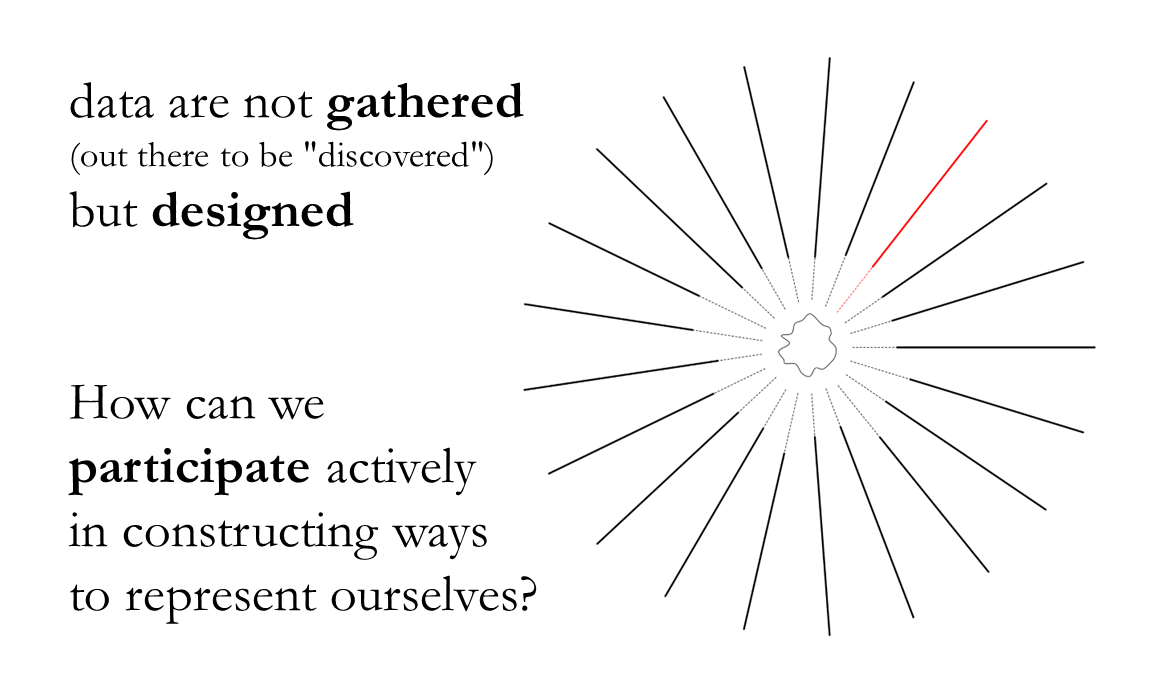09.06.22, 15:30
Community Data Practices Workshop
what: “Beyond Prediction: Data reflections from me to us”
when: Thursday, June 9th, 15:30*, duration 2H (including a short break)
where: Alte Münze, Berlin
cost: FREE; register here
This workshop is part of the Weizenbaum Conference) Kit Kuksenok, Christel De Maeyer, and Minha Lee. It incorporates the activities, prompts, and methods under investigation in the Safety in Numbers project.
*This is a slightly different time than in some older versions of the online program, but this one is correct. The finalized program will be accurate closer to the conference date, too.
Unlike other poetic events within the safety in Numbers project, this workshop will engage (1) with health more generally than hormones, and (2) more with questions of data sovereignty than of health or bodily experience. Through this workshop, participants will:
- try out new ways of encountering tracked and health data for reflection
- practice applying critical and reflective data practices to health data and beyond
- experience community data reflection in action, and reflect on their values with respect to data
Please feel free to reach out IG/@xn_ze_ro with any questions!
Workshop Abstract
Gathered data, such as steps walked or hours slept, are quantified summaries of behavior that can be difficult to interpret meaningfully or to act upon. Quantitative data are suggested to be the backbone of predicting one’s future health, but this can hamper, rather than support, everyday citizens’ understanding of their health: predictions based on quantification provide a narrow look at what it means to be healthy or well, and proprietary technologies are riddled with changing, unverifiable, biased inaccuracies. One motivation for self–tracking through “quantified–self” interventions is to gain visibility of an unseen body experience and to control some aspect of life, but the available tools and resources not only fail to deliver on many expectations of visibility and control but also introduce new sources of obscurity and powerlessness.
This workshop combines expressive, artistic exercises and discussion prompts to highlight otherwise obscured problems of digital health data: when algorithmic decisions on collection and analysis are hidden; and when appealing visualizations look more certain than they ought to. We explore how data are not gathered, i.e., out there to be “discovered”, but designed. We can participate actively in constructing ways to represent ourselves. Second, we consider rich data generation, starting with qualitative data we design. Qualitative data, such as visuals or text, resist common summarization practices that quantitative data affords, and are thus rich sites for considering the role of algorithmic classification and summary visualization to reduce and contain. Based on prior workshops that feature daily artistic practices of re–thinking what data can be, the organizers offer activities on designing data reflections to move beyond quantifying our health states.
The workshop activities advocate in–person, hands–on artistic data creations. This is done to foster a greater engagement on the following: We see ourselves not as passively predicted beings, but as actively reflective beings. The workshop will close with a discussion on how individual data reflections connect to collective reflections on the notion that we can share and shape the societal dialogue on what counts in expressing our health, and how working with our own health data can help us be more reflective and critical consumers of data more broadly.
Further Reading
.
- D’ignazio, Catherine, and Lauren F. Klein. 2020. Data Feminism. MIT Press. [You can read it online for free here!]
- Lupi, Giorgia, & Stephanie Posavec. 2018. Observe, collect, draw!: A visual journal. Princeton Architectural Press.
.
The role of art in personal data practice is also something I’ve been exploring with artist Marisa Satsia for the last several years:
- Kuksenok, Kit & Marisa Satstia. 2021. “Know thy Flesh: What Multi-disciplinary Contemporary Art Teaches Us about Building Body Knowledge.” xCoAx 2021 Proceedings. [Free PDF]
